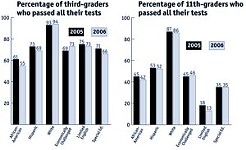UT Students Sell the CIA
Controversial biz-school course offers 'real-world' marketing for spy shop
By Rachel Proctor May, Fri., Oct. 8, 2004

The Central Intelligence Agency wants to do a better job of educating students about the exciting career opportunities it has to offer. "The CIA wants to change its image," said Grant Jones, a University of Texas finance major. "There are a lot of misconceptions."
And what better way to change that than get a group of UT students to develop a marketing plan, using data gathered from their fellow students in UT classrooms, and then implement that plan on their campus? This is what Jones is doing, as one of 13 students enrolled in a course at the McCombs School of Business where students work with a company called EdVenture Partners to gain real-world marketing experience – by really marketing the CIA to their fellow students. This, not surprisingly, has raised some eyebrows on campus.
The issue arose when Jones and his classmates contacted professors, primarily in the departments of Middle Eastern studies and Asian studies, to ask permission to use class time to survey students about their attitudes toward the CIA. Many of the professors declined, concerned that it was inappropriate to use educational time to gather marketing data. "However little time the survey takes, it's not my prerogative to take students' time and give it to someone else," said Robert Oppenheim, an assistant professor in Asian studies.
He and others also questioned whether the supervising professor had followed university policies regarding "human-subjects" research. By UT policy, any project that will collect data from human subjects, must go through official approvals – "like a normal bureaucracy," joked Lee Smith of the UT legal affairs department, "but the system does exist for a reason." Some exemptions exist – journalism students, for example, do not have to receive permission every time they want to quote a fellow human. And marketing classes obviously need some leeway to teach the fine art of marketing.
However, when the information is being gathered on behalf of an outside organization, the educational purpose of the exercise becomes a lot less clear. EdVenture Partners' Web site is clear that education is not its only goal. After explaining that today's youth respond best to marketing messages delivered through "peer networks" and "word of mouth," the site explains that the company creates "innovative, education-based college marketing programs that utilize students, while enrolled in a for-credit class, to create and implement marketing and communication strategies for you. Students receive an unparalleled educational experience they will put in their resumes, and you leave with what every marketer dreams of ... Results – developed by the target audience for the target audience."
While a representative of the UT office that oversees human-subjects research was unfamiliar with the course (and upon learning of it said she would look into it "immediately"), it appears that it may violate university policies. "Professors are not supposed to be using their position, where [they're] supposed to be providing an education, to be engaging in marketing surveys," said Smith.
This is the third semester the course has been offered; previous campaigns marketed Honda and the U.S. Department of State. Nevertheless, considerable confusion exists as to whether the course conforms to university guidelines – and who is responsible for finding out. Lecturer Herb Miller, who teaches the course, said he was unaware of human-subjects policies, and added that any further comments should be made by the students in the class. (This is, after all, a "real-world" experience.) The student serving as the group's PR representative said he wasn't sure what he was allowed to say and referred all questions back to Miller.
Beyond questions of proper procedure, the fact that the client is the CIA adds another level of sensitivity for professors of Middle Eastern and Asian studies. A bill currently in Congress (HB 3077) would create a federal advisory panel with broad powers to influence hiring and curricula to provide "balance" (i.e., less criticism of U.S. policy) in international studies departments; it has been approved by the U.S. House of Representatives and will be reviewed by a Senate committee this month. In a situation like that, says Karin Wilkins, a Radio-Television-Film professor who studies the Middle East, it's not only students who feel intimidated into participating, but professors as well. "What are the implications for professors who don't participate?" she asked. "What are the implications for their departments?"
All that aside, the students were able to collect about 350 surveys, which they will use to develop campus-based recruitment and awareness activities throughout the fall. Already, Jones says, they've gained a better understanding about the kind of marketing obstacles facing the agency. "One of the questions we asked was whether they had ever considered a career with the CIA, and why or why not," said Jones. "For the 'why not,' we got a lot of responses like, 'I don't want to get shot at,' 'I don't want to get killed,' or 'It's too risky.' But really it's not like that," he said.
In fact, Jones himself has considered a career as a financial analyst with the CIA. "They pay a little better than most government agencies," he said. "And they have great benefits."
Got something to say on the subject? Send a letter to the editor.










